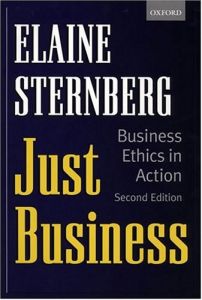Acesse a sua conta getAbstract para obter o resumo!

Acesse a sua conta getAbstract para obter o resumo!
Elaine Sternberg
Just Business
Business Ethics in Action, Second Edition
Oxford UP, 2000
Sobre o que é?
If it’s good for the business can it really be ethical?
Recommendation
Elaine Sternberg has written an important, fascinating look at business ethics. Despite its academic presentation, it hooks you right away, and keeps you hooked. She is not fuzzy in her ethical analysis; there is no moral posturing to be found. This book is a practical decision-making guide for businesspeople. Sternberg builds an ethical framework that starts with the fundamental premise that the goal of business is to increase owner value. If an ethical issue relates to that goal, it’s one you must address. If not, it’s not your problem. Once you’ve identified an ethical dilemma that you must resolve, Sternberg guides you through a series of intellectual exercises that narrow your options, identify your constraints and ultimately help you arrive at the correct answer. getAbstract recommends this book as a seminal introduction to ethical decision making for business men and women that should be read by all and referred to often.
Summary
About the Author
Elaine Sternberg is an academic philosopher and international investment banker, and has been the head of successful businesses. She is now principal of a London-headquartered consultancy firm, and Research Fellow in Philosophy at the University of Leeds.



















Comment on this summary